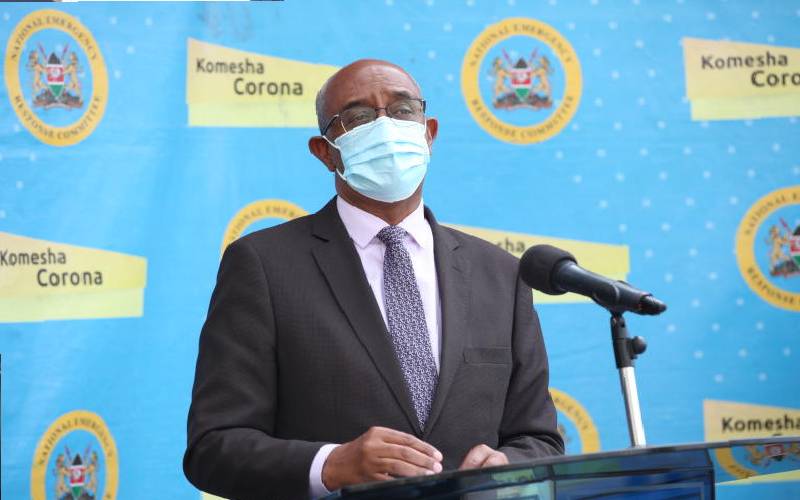
Health CAS Dr Rashid Aman at Afya House on Friday. [Standard]
Kenya has not recorded any deaths related to coronavirus in the last 24 hours.
In his update on Covid-19 at Afya House on Friday, Health CAS Dr Rashid Aman said 241 new coronavirus cases in the last 24 hours were reported from 4,520 samples. The national tally now stands at 33,630. There were no reported deaths, thus the fatality tally still stands at 567.
From the new Covid-19 cases reported in Kenya in the last 24 hours, 228 were Kenyans while 47 were foreigners. In terms of gender 152 are males and 89 females. The youngest case is a one-year-old baby while the oldest is 86 years.
The distribution of the cases by counties stood at 113 in Nairobi, 14 in Mombasa and 10 in Taita Taveta, among others.
Sixty-six patients have recovered from the disease, 40 from the Home-Based Care programme and 26 from various hospitals. The national recovery tally now stands at 19,434.
How you eat and manage your general health is linked to how your body will respond to the coronavirus, CAS Aman added.
Issuing the national Covid-19 update, Dr Aman said good nutrition is important for growth and development throughout one’s life course.
"It also boosts immunity, reduces the duration of infection, improves response to treatment, speeds up recovery, reduces treatment costs, reduces the risk of getting other infections and prevents disability and death."
The country still has challenges of malnutrition, and the ministry is yet to attain internationally accepted levels and standards of healthy nutrition for the population.
Undernutrition adversely affects the growth and development of children resulting in stunting, underweight and wasting. In our children under five years, 25 per cent suffer stunting, four per cent suffer wasting, and 11 per cent are underweight.
Dr Aman went on, adding that about 45 per cent of deaths among children of this age group are associated with undernutrition.
He said overnutrition, on the other hand, results in overweight and obesity, conditions that present serious health risks.
Twenty-eight per cent of adults aged between 18 and 69 years are either overweight or obese, as the rising burden of overweight and obesity, coupled with diet-related non-communicable diseases in adults, is a matter of concern to the Ministry. Lack of balanced diets that provide the body with essential micronutrients, is still common. Super-imposed upon infectious diseases such as malaria, the challenge of micronutrient deficiencies, is substantial. "The Covid-19 pandemic poses a grave risk to the nutritional status, and survival of vulnerable population groups such as young children, pregnant and lactating women, persons with underlying medical conditions, people living with disabilities and the aged," Dr Aman said. Meanwhile, the Health ministry has developed several guidance documents for the continuity of essential health services. However, according to the Integrated Phase Classification of Acute Malnutrition report released on Thursday, the nutrition and food security situation in the country is still intact. Malnutrition levels, however, still remain unacceptable, especially in the arid counties. The Standard Group Plc is a multi-media organization with investments in media
platforms spanning newspaper print
operations, television, radio broadcasting, digital and online services. The
Standard Group is recognized as a
leading multi-media house in Kenya with a key influence in matters of national
and international interest.
The Standard Group Plc is a multi-media organization with investments in media
platforms spanning newspaper print
operations, television, radio broadcasting, digital and online services. The
Standard Group is recognized as a
leading multi-media house in Kenya with a key influence in matters of national
and international interest.











